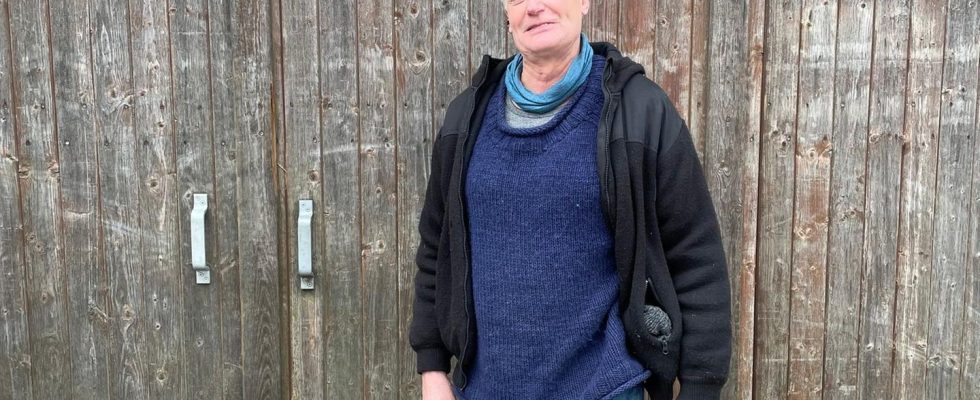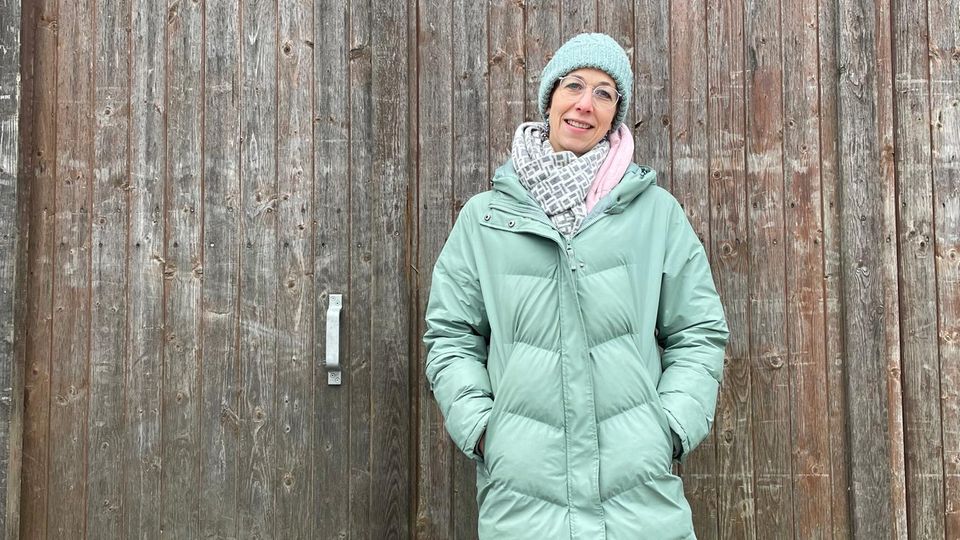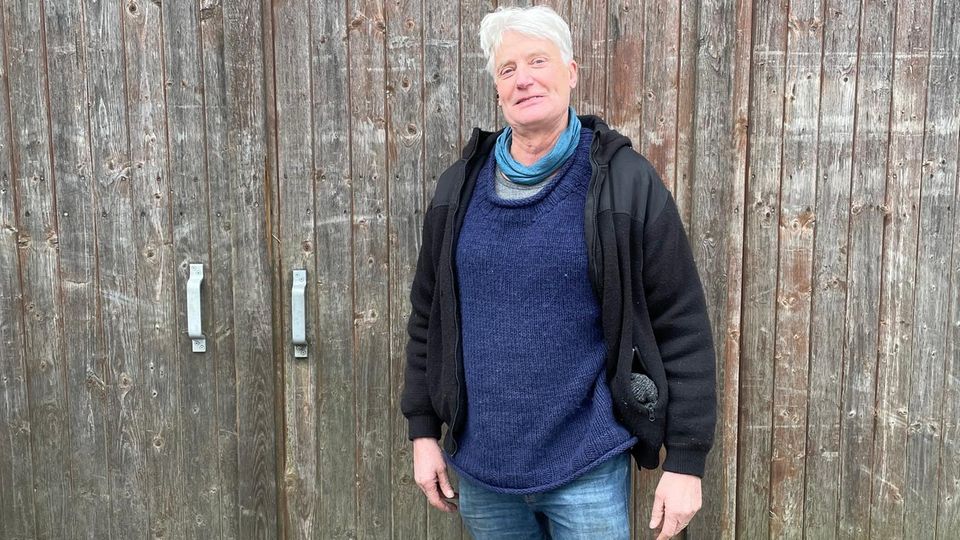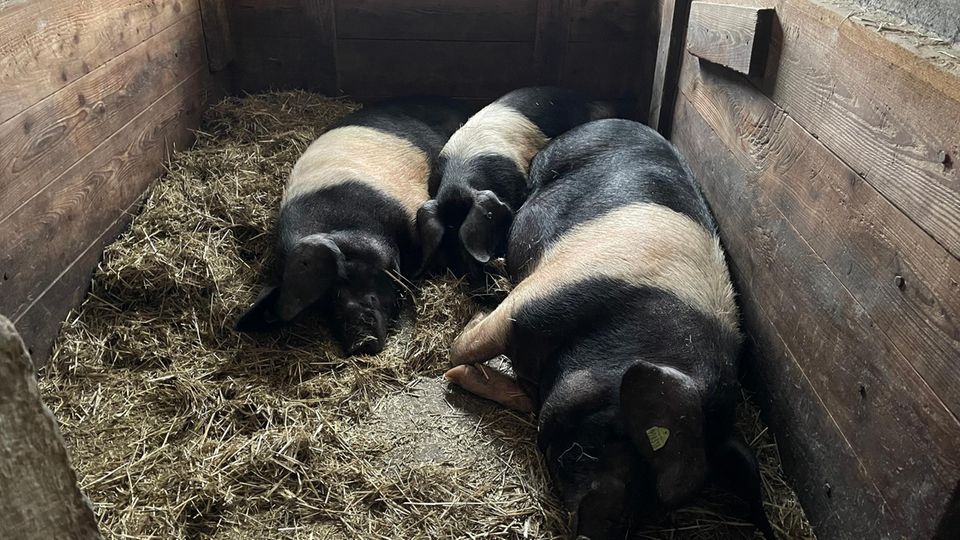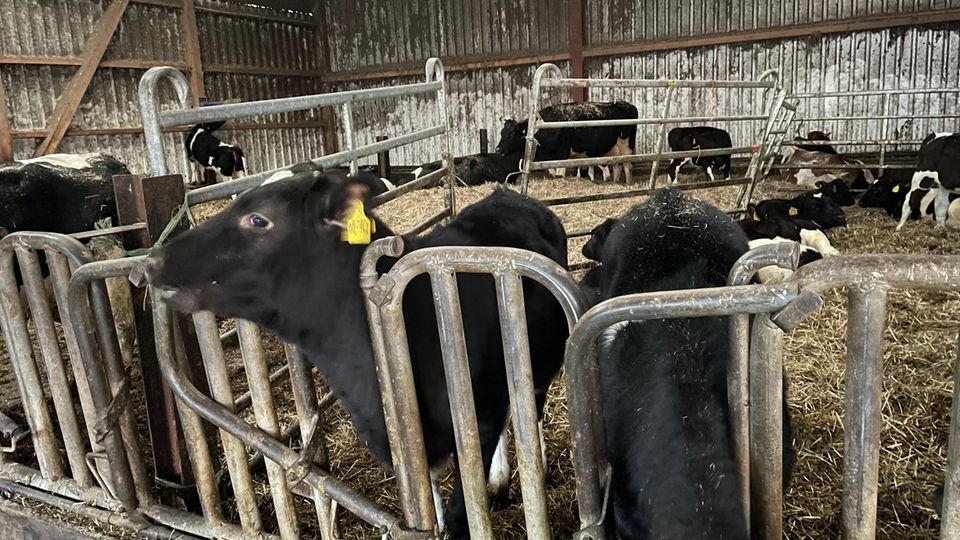Mathias von Mirbach runs the Kattendorfer Hof solidarity farm near Hamburg. He is also affected by the federal government’s austerity plans. But his worries are different.
He doesn’t have much time now, a farm like this doesn’t happen on its own. But he still shows the animals. Mathias von Mirbach walks calmly across the yard, the frozen snow crunching under his feet. Cows lie on a thick layer of manure in the long stable building. “Nurse cows,” says the farmer, “they suckle the calves that lie between them.” The sparrows whistle under the rafters as if it were spring. Otherwise it is quiet on the Kattendorfer Hof, while tractors block the traffic not far away.
Farmers all over the country are demonstrating against cuts in subsidies. Mathias von Mirbach has also placed a tractor on the meadow at the entrance to the village with a banner hanging on it with the warning question: “Grandpa, what is a farm?” His protest is a silent one.
Farmer protests from the perspective of solidarity and organic farming
He operates differently than most of his colleagues, namely in solidarity and ecologically, but his farm, the Kattendorfer Hof, is also affected by the federal government’s austerity plans. Mathias von Mirbach wears jeans, a wool sweater and a fleece jacket. He founded solidarity farming in 1998, when few knew what it was. Together with 80 employees, he manages almost 450 hectares, taking care of pigs and cows, fields and the gardening. The operation, which is run according to Demeter guidelines, is financed by the members. Sometimes it’s around 950, sometimes 1000. You commit your membership to one year and pay 226 euros per month for the full harvest share. The products are also offered in seven farm shops.
From Mirbach the route leads past the long brick building that houses the farm’s own cheese dairy and over to the office, where Katja Dungworth is waiting. Like him, the 42-year-old runs the business and looks after the staff; she has lived on the farm with her family for more than ten years. Between computers and warm chairs, the question now is: What makes the farmers so angry? And why aren’t you on your tractors? Wouldn’t that be solidarity? “No longer possible since the incident with Habeck,” replies Mathias von Mirbach. When the Minister of Economics was prevented from getting off a ferry in Schlüttsiel by angry protesters. Von Mirbach finds the idea of protesting between people who are prone to violence threatening.
And yet he can understand them, the angry ones, they lack appreciation and recognition. The Kattendorfer Hof is also affected by the planned cuts in diesel subsidies: if motor vehicle taxes were levied on its agricultural vehicles and the prices for Co2 emissions were raised, the farm would incur additional costs of 16,000 euros per year.
With a turnover of around 1.6 million, that would be one percent less income, which could be offset with eight new members. A small minus compared to other large companies. Von Mirbach and Dungworth are more concerned about agriculture itself, about the bureaucracy and the frustration that is now evident across the country. “The farmers feel left alone by politics,” says von Mirbach, “they feel like they are being bullied.” He, too.
Mathias von Mirbach, 65, has been practicing biodynamic farming for 38 years. In 1998 he founded the Kattendorfer Hof solidarity farm.
© Lisa Frieda Cossham
The master farmer has been working biodynamically for 38 years and nothing has changed; except for the controls, which are becoming increasingly tighter. The terms. The small print that seeps into everyday farm life via his computer screen. “As if we were constantly under general suspicion,” says von Mirbach. Although he fertilizes as usual, he now has to log each field individually and upload the data to the internet. Dungworth remembers inspections in which cobwebs or a fly were supposed to be documented: “Please enter them on the grid, they said,” says the farmer.
Every animal movement of cattle must also be recorded: If a young animal is brought to the pastures in the neighboring district where the second farm is located, the animal number and destination must be registered. Each animal has a digital file that must be maintained. You have now hired an employee who only takes care of verification and controls. Von Mirbach estimates that this work takes 1,000 hours a year. How should a family-run business meet these demands without despairing?
But Katja Dungworth and Mathias von Mirbach are worried not only by authorities, but also by companies such as Edeka, Aldi, Lidl and the Schwarz Group. They describe them as the largest organic retailers. In the last two or three years, this competition has become more noticeable and shows that food is still not sufficiently valued.
Compared to other industrialized nations, Germans spend the least money on food, on average ten percent of their disposable income. In France it is 15.2 percent, in Spain 20.6. During the pandemic, it seemed as if Germans were adopting a new attitude: they were spending more money on food and making sure they ate well. “But this idea,” says von Mirbach, “has moved into the background again. The number of members has fallen by two percent. Sales in some farm shops have fallen by 20 percent.”
Anglers live on the Kattendorfer Farm, saddle pigs that belong to the breed of domestic pigs. At 130 kilos, they are driven to the slaughterhouse 15 kilometers away.
© Lisa Frieda Cossham
It is people’s fear that concerns Mathias von Mirbach the most. Being a member of a solidarity agriculture means making a commitment, at least for a year. “But people,” says the farmer, “are only looking at the next month. They’re holding on to the pennies.” Katja Dungworth has also observed that in uncertain times, people are more likely to spend money on travel than on shopping. Although we are living more and more consciously, the good still seems to be something other than organic food.
Why? “For me, agriculture is extremely political,” says von Mirbach, “and that also includes food prices.” He speaks of the agricultural reform in 1992, when pricing was adjusted to the world market and subsidies were introduced, which he sees as compensation: “We wouldn’t need them if food prices were higher,” he says. “Agriculture is a plaything in the economy as a whole.”
They are raised by foster cows: calves in the stable at the Kattendorfer Hof near Hamburg.
© Lisa Frieda Cossham
But haven’t the farmers made record profits? Over the past 30 years, has the industry perhaps gotten used to being constantly subsidized and outsourcing responsibility? “It was individual record profits,” replies von Mirbach, “the industry is heterogeneous.” In southern Germany there are many part-time businesses and smaller farms. Large companies can be found primarily in the east and north of the country. Fewer and fewer people are managing ever larger farms. With an annual withdrawal of 35,000 euros, von Mirbach is not one of the rich farmers. Those who followed the market would get rich.
So grow wheat when wheat is doing well. Rapeseed when rapeseed is required. There are no monocultures on the Kattendorfer farm, instead there are diverse crop rotations. The company is the largest full-service Solawi in Europe. This means that members receive meat and dairy products in addition to vegetables. Von Mirbach is convinced that other farmers would also farm organically if they were guaranteed the purchase of their products.
Action week
“Absolutely understandable” to “disproportionate”: This is how the parties feel about the farmers’ protests
Silence has fallen in the adjoining rooms, where plates were just clattering. The lunch break is over, now it’s time to visit the animals. The calves first, then we go over to the pigsty. In one box three black and white angler saddle pigs are sleeping huddled together, in others they are excitedly scurrying around each other, nudging each other and grunting.
It’s hard to imagine anyone checking cobwebs here. Flies complained. European agricultural policy, the guidelines, bans and cuts seem distant. The anger, the protest. The greed of some, the desperation of many, the fear. On the way back we cross peaceful countryside, past corn stubble that sticks out of the snow cover like thin hair. But behind Kaltenkirchen the traffic is backed up. Honking tractors pass by: “This is how it goes,” the cardboard says, “it can’t go any further.”

